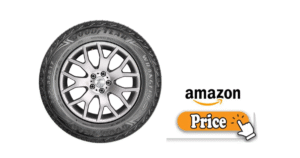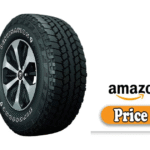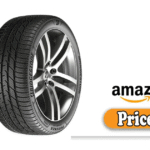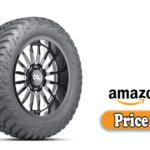Your tires are the only part of your vehicle that touch the road, which means their importance can’t be overstated. Whether you’re tackling off-road adventures, commuting in stop-and-go traffic, or navigating snow-covered highways, your tires determine how safely and efficiently you drive.
That’s where Goodyear tires come in. With over a century of innovation, reliability, and award-winning performance, Goodyear has become a household name for a reason. From their all-season touring lines to ultra-high-performance summer tires and rugged all-terrains, Goodyear offers something for nearly every driver.
Whether you’re a long-haul driver, performance enthusiast, or weekend commuter, this article will help you make an informed decision.
What I Like About Goodyear Tires
Goodyear has earned its reputation with a combination of durability, innovation, and driver-focused design. Here’s what stands out:
1. Versatile Product Line for All Drivers
Goodyear offers a comprehensive selection of tires for sedans, SUVs, trucks, sports cars, and hybrids. From the Assurance line (perfect for daily commuters) to the Wrangler All-Terrain (great for trucks and SUVs), there’s a tire for every road and weather condition.
2. Confidence in All Conditions
Their all-season and winter tires consistently score high in wet and snowy conditions. Goodyear’s proprietary tread compounds and technologies, such as Weather Reactive Technology and ActiveGrip, help deliver reliable traction across the board.
3. Run-Flat and Fuel-Efficient Options
Goodyear offers RunOnFlat tires that let you drive up to 50 miles after a puncture. Their Fuel Max Technology helps reduce rolling resistance, improving gas mileage, ideal for environmentally conscious or cost-conscious drivers.
4. Strong Warranty Programs
Most Goodyear tires include mileage warranties ranging from 40,000 to 85,000 miles, plus 30- to 60-day test drive guarantees. That’s an extra piece of mind at no extra cost.
5. Widespread Availability & Competitive Pricing
From local shops to major retailers like Discount Tire and Costco, Goodyear tires for sale are widely available and often at competitive prices. Frequent rebates and promotions also help you save.
What Could Be Better
Even with its strengths, Goodyear isn’t perfect. Here are a few areas where the brand could improve:
1. Road Noise on Some Models
While Goodyear generally delivers solid ride quality, a few models like the Wrangler Duratrac and Eagle Sport have been noted for moderate road noise, especially on highways or in performance vehicles.
2. Shorter Tread Life on Ultra-High Performance Tires
If you’re considering Goodyear’s high-performance summer tires like the Eagle F1 Asymmetric 3, expect faster tread wear. This is typical in the UHP category, but it’s something to keep in mind.
3. Cost on Premium Lines
While Goodyear offers many mid-range priced options, their premium models, especially those with RunOnFlat or WeatherReady technologies, can get pricey compared to competitors like Hankook or Falken. 👉🏿👉🏻 Check the Latest Price and Offer at Amazon 👈🏻👈🏿
👉🏿👉🏻 Check the Latest Price and Offer at Amazon 👈🏻👈🏿
My Personal Experience with Goodyear Tires
I’ve owned and tested multiple Goodyear models over the years, from compact sedans and family SUVs to a workhorse pickup. Here’s my honest breakdown:
1. Goodyear Assurance WeatherReady (Honda Accord)
This all-weather tire was a game-changer. It handled rain and slush impressively well and stayed quiet even on rough pavement. After 50,000 miles, I still had decent tread left, and the grip in unexpected snowstorms was truly reassuring.
2. Goodyear Wrangler TrailRunner AT (Toyota Tacoma)
I put these to the test on gravel, trails, and dirt roads. They held up beautifully, aggressive enough for off-road, but tame enough for city driving.
The sidewalls felt solid and gave me confidence on remote backroads. They did produce a slight hum at freeway speeds, but nothing intrusive.
3. Goodyear Eagle Sport All-Season (Dodge Charger)
As someone who enjoys spirited driving, I appreciated the grip and responsiveness on dry roads. Wet performance was good, but tread life seemed to fade faster than expected, around 35,000 miles before needing replacement.
Design & Technology
Goodyear continues to push the envelope when it comes to tire technology. Here’s a look at the engineering that drives their performance:
TredLock Technology
Microgrooves within the tread blocks lock together for confident cornering while expanding during braking or acceleration to provide grip.
Weather Reactive Rubber Compounds
Used in the Assurance WeatherReady and other models, this compound adapts to changing temperatures for better traction in all seasons.
Durawall Sidewall Protection
Reinforced sidewalls are designed to resist cuts and abrasions, especially helpful in the Wrangler off-road series.
Evolving Traction Grooves
As the tire wears, new grooves appear to maintain consistent wet-weather performance throughout its lifespan.
RunOnFlat (ROF) Construction
Special bead and sidewall structures allow some tires to continue driving up to 50 miles at speeds up to 50 mph after a puncture.
Performance Breakdown
Here’s how Goodyear performs across different categories:
| Performance Category | Recommended Goodyear Tire | Key Features |
| All-Season Touring | Assurance ComfortDrive | Smooth, quiet, and long tread life |
| All-Weather | Assurance WeatherReady | 3PMSF rated for snow; usable year-round |
| Performance/Sport | Eagle F1 Asymmetric 6 | Crisp handling, strong grip in dry and wet conditions |
| Light Truck/SUV | Wrangler TrailRunner AT | Off-road capable with highway manners |
| Winter | Ultra Grip Ice WRT | Studdable option with great snow and ice traction |
| Fuel-Efficient | Assurance Fuel Max | Low rolling resistance for improved fuel economy |
Build Quality & Durability
Goodyear’s rigorous manufacturing standards and global production footprint ensure consistency across its product lines.
Key Build Highlights:
- Uniform Tire Quality Grading (UTQG): Goodyear tires consistently score well in treadwear and temperature resistance.
- Reinforced Belt Design: Steel belts and polyester cord plies offer structural integrity and smooth ride comfort.
- Sidewall Durability: Particularly in the Wrangler series, sidewalls are built to resist punctures and abrasions.
Their premium lines are manufactured in North America, Germany, and Asia, with strict quality controls. When you buy Goodyear tires for sale, you’re often supporting advanced R&D and long-term performance.
Alternative Options
If Goodyear isn’t quite the fit for your needs, here are some top competitors worth considering:
1. Michelin
Known for longevity and comfort. Their Defender T+H and CrossClimate2 rival Goodyear’s Assurance line in tread life and weather capability.
2. Bridgestone
Offers excellent fuel-efficient and performance tires. The Turanza QuietTrack and Blizzak series are strong alternatives to Assurance and Ultra Grip.
3. Continental
The TrueContact Tour is comparable in price and outshines many in wet braking. A quieter ride than some Goodyear models.
4. Falken or Hankook (Budget-Friendly)
While not quite as refined, brands like Falken Wildpeak AT3W or Hankook Kinergy GT offer solid value for the price-conscious shopper.
Read More: Quaker State vs Valvoline: A Comprehensive Comparison
Final Thought
Goodyear strikes an ideal balance between innovation, real-world performance, and trusted durability. With a rich history of motorsports, commercial transport, and passenger vehicle excellence, Goodyear tires are more than just rubber on a rim; they’re a promise of safety, confidence, and quality.
If you’re currently exploring Goodyear tires for sale, the bottom line is this:
Whether you’re a daily commuter, long-distance hauler, off-road enthusiast, or weekend driver, Goodyear likely has a tire that fits your needs and does it well.
With advanced technologies, widespread availability, and robust warranty coverage, Goodyear remains one of the most dependable tire choices in the world.
FAQs: Goodyear Tires For Sale | My Honest Experience
Q1: Are Goodyear tires a good investment?
Yes, Goodyear tires offer excellent long-term value through a mix of performance, safety, and warranty coverage. While not always the cheapest, the quality you get is consistently high.
Q2: Which Goodyear tires are best for winter driving?
The Goodyear Ultra Grip Ice WRT and WinterCommand series perform exceptionally in snow and icy conditions. The Assurance WeatherReady is a good all-weather alternative for mild winter areas.
Q3: How long do Goodyear tires typically last?
Depending on the model and your driving habits, Goodyear tires can last anywhere from 40,000 to 85,000 miles. Touring tires last longer, while performance tires wear faster.
Q4: Are there Goodyear tires that can run after a puncture?
Yes. Many Goodyear tires feature RunOnFlat technology, allowing you to drive up to 50 miles at 50 mph after losing air pressure.
Q5: What kind of warranty do Goodyear tires come with?
Most Goodyear tires come with a limited treadwear warranty ranging from 40,000 to 85,000 miles, plus a 30- to 60-day satisfaction guarantee.
Q6: Do Goodyear tires perform well in the rain?
Absolutely. Goodyear’s Wet Traction Score is excellent across most categories. The Assurance ComfortDrive and Eagle Sport models, in particular, handle wet roads confidently.
Q7: Where can I find the best Goodyear tire for sale deals?
Check Goodyear’s official site, Tire Rack, Discount Tire, and Costco for rebates, seasonal discounts, and free installation promotions.
Q8: Are Goodyear tires noisy?
Most Goodyear tires offer a quiet ride, especially the Assurance line. Some off-road or sport models may generate more noise, but nothing excessive.
Q9: What are Goodyear’s most fuel-efficient tires?
The Goodyear Assurance Fuel Max is designed with low rolling resistance to improve gas mileage, often helping drivers gain 1-2 extra MPG.




